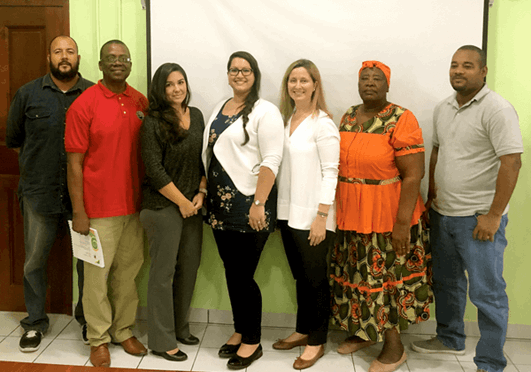The rise of diabetes mellitus (DM) and its complications is a public health concern in the Caribbean. The Caribbean Diabetic Retinopathy (DR) Programme, managed by the London School of Hygiene & Tropical Medicine (LSHTM) and funded by the Queen Elizabeth Diamond Jubilee Trust, focuses on the prevention of blindness due to diabetic retinopathy in four countries: Jamaica, Dominica, Belize and St Lucia [1,2]. The prevalence of diabetes in these countries ranges from 10.9% to 17.1% [3] and it is estimated that there are around 238,000 people in the programme countries who have diabetes and need a regular eye examination. Around 24,000 of them need treatment to prevent visual loss [4].
In March 2017, Belize and Brighton formalised a VISION 2020 LINK with the aim of facilitating the skills required for screening and treatment of diabetic eye disease in Belize. The objectives of this partnership were to build human resources for diabetic retinopathy screening and treatment and to assist with programme development and expansion of DR services and awareness countrywide.
What is the DR need in Belize?
Data from 2017 from the Ministry of Health (MoH) in Belize shows that DM is among the top five leading causes of death among both females and males (Figure 1).

Figure 1: Top five causes of death by region in Belize: number of deaths by cause, 2017.
The population aged >20 years makes up 78.8% of the total 375,000 population [5]. Given the estimated prevalence of DM in over 20s of 17.1%, there are approximately 50,000 people living with diabetes (PLWD) in Belize needing annual screening [3]. Approximately 10% of these will present with vision-threatening diabetic retinopathy (VTDR) and will need treatment.
The Eye Health System in Belize
The general health system in Belize is organised into four Health Regions (Northern, Central, Western and Southern), where services are delivered at health centres, polyclinics and at the four Regional Hospitals. In 2002 a National Health Insurance Scheme was introduced covering some areas of the country. The Belize National Referral Hospital, primarily government funded, provides specialty care for the entire country.
The public health system does not offer eye care services at primary, secondary or tertiary level. A not-for-profit social enterprise, the Belize Council for the Visually Impaired (BCVI) provides eye care services in Belize. BCVI operates independently within the terms of a Memorandum of Understanding with the MoH and has a workforce of 36 staff and a budget totaling US$1.4m annually [6].The organisation offers comprehensive eye care services via five Primary Eye Care (PEC) clinics across the country and one National Eye Clinic (NEC) based in Belize City (Figure 2).

Figure 2: Location of the five BCVI PECS and the NEC.
In 2016 the National Eye Health Strategic Framework (NEHSF) 2015 – 2020 was issued by BCVI in collaboration with the MoH and Pan-American Health Organization (PAHO). A national consultation with key partners and stakeholders resulted in the identification of four major areas of need: strengthening human resources, increased financial support for eye care, strategies to ensure referral of eye health problems and a strengthened integration of eye health data.
There are four practising ophthalmologists in Belize, three of whom work in the private sector. The remaining ophthalmologist works at BCVI delivering primary and secondary eye care services, but doesn’t perform intraocular surgery. There are three optometrists working at BCVI and an additional three optometrists in the private sector. To cope with the demand for surgical services BCVI relies on additional volunteer input from visiting ophthalmologists and groups from other countries.
Information on patient visits, whether at the primary or secondary level, is entered into the Belize Health Information System (BHIS). This allows continuity of care for individual patients and is part of the MoH information system.
VISION 2020 LINKS Programme collaboration
Through the VISION 2020 LINKS Programme, Belize was linked with Brighton and Sussex University Hospitals. To date, the following training activities have taken place:
- September 2017 – Diabetic Retinopathy Planning Workshop [4]. The BCVI and MoH team travelled to Jamaica to work with the LINK partner and agreed a two year strategic plan to improve and scale up DR services in Belize.
- December 2017 – The VISION 2020 LINKS team travelled to Belize to train the BCVI screener / graders [2].
- June 2018 – A Belize MoH representative attended the Dominica Diabetes National Workshop, facilitated by the VISION 2020 LINKS Programme, where Dominican and regional partners shared information and discussed strategies for integration of DR services into DM and Non-Communicable Diseases (NCDs) strategy [7].
- November 2018 – The team from LSHTM and Brighton travelled to Belize to work with the implementing partner, BCVI and the MoH. The aim of this visit was to increase the number of diabetic patients that receive an annual retinal examination in Belize. The specific objectives were:
- To deliver refresher laser training to the programme ophthalmologist, particularly macular laser.
- To educate MoH primary care physicians and health personnel country wide on prevention of the microvascular complications of DM and the DR screening programme referral system.
- To sensitise the MoH on the importance of including DR into the national policies for NCDs and into the Primary Care Diabetes Management Guidelines.
To deliver the objectives, the November LINKS visit conducted three main activities:
- Laser training
- Educational sessions on DM and its complications
- Briefing meeting with MoH
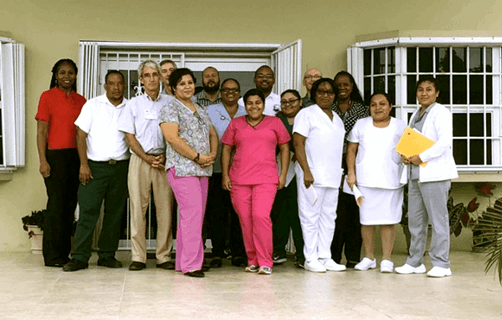
Workshop attendees in the Western Health Region, with members of the Belize-Brighton VISION 2020 LINK.
1. Laser training
Ms Lucy Howe, UK LINK Ophthalmologist, conducted a week of one to one training with the BCVI Ophthalmologist Dr Zoraida Diaz. Using as reference the DR-NET Laser Treatment Manual, the sessions covered optical coherence tomography (OCT) interpretation in diabetic eye disease; clinical aspects of DR and management of patients with DR [8]. Additionally the doctors conducted joint DR grading and treatment clinics where Dr Diaz delivered laser treatment to several patients and received feedback from Dr Howe.
2. VISION 2020 LINKS education sessions on DM and its complications
The Belize MoH organised countrywide education sessions aimed at primary care physicians and health personnel. A total of 52 participants including doctors, nurses, regional health authority managers and primary care coordinators attended the sessions, which were delivered by the Belize-Brighton LINKS Team.
The following table illustrates the programme topics discussed in each session and the speakers. The sessions were 3 to 3.5 hours long, including time for questions and discussion:
Speaker
Donovan Cacho – National Eye Care Coordinator, MoH
Topic
Summary of MoH policies and guidelines, country data, DM and complications
Speaker
Andrew Smith – Diabetologist, Brighton
Topic
Diabetes and microvascular complications
Speaker
Martin Turns – Podiatrist, Brighton
Topic
Diabetic foot prevention strategies
Speaker
Leolyn Garcia – Programme Director, BCVI
Topic
DR screening programme and BCVI services
Speaker
Baxter McLendon – Visiting Ophthalmologist, BCVI
Topic
DR overview
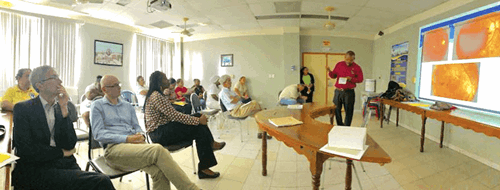
Mr Donovan Cacho presented national data on NCDs and Diabetes from 2017 and explained three main MoH documents which lay out the policy and guidelines for DM and DR in Belize. These are:
- Register of Policies, Guidelines, Protocols and Manuals
This document is a register of policies, guidelines, protocols and manuals that the MoH uses when addressing different health needs, including hypertension and diabetes.
- Belize National Plan for the Prevention of Non-Communicable Diseases
The NCD Strategic Plan has been published to guide the direction of the activities towards prevention, education, treatment and planning. Although DM is included in this plan, DR is not covered.
- National Eye Health Strategic Framework for Belize
This document outlines the main eye care priorities for Belize and the strategies to control them.
Dr Andrew Smith, Diabetologist, presented the epidemiology of diabetes in Belize and focused on the microvascular complications. The nine processes of diabetic care outlined in the UK diabetes guidelines were discussed [9].
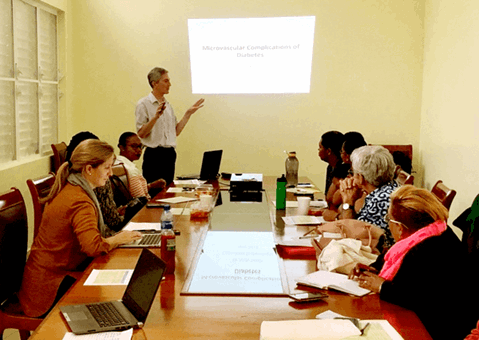
Andrew Smith teaching on diabetes and microvascular complications.
Nine care processes for DM care:
The UK guidelines propose nine care processes which are important to check annually for every patient presenting with diabetes:
- HbA1c
- Blood pressure
- Serum cholesterol
- Serum creatinine
- Urine albumin
- Foot risk surveillance
- BMI
- Smoking history
- Retinal screening
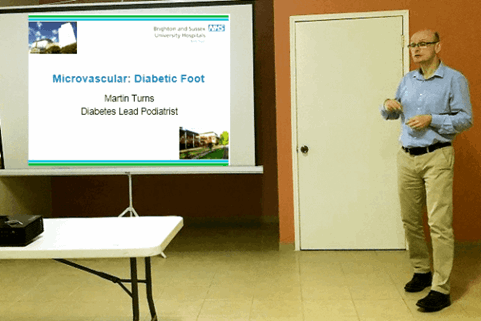
Martin Turns teaching on diabetic foot prevention strategies.
Martin Turns, Podiatrist from the Brighton LINK, discussed the prevention of amputations in diabetes, where four out of five amputations could be prevented with good diabetes healthcare and support. Most amputation cases begin as foot ulcers and are far more treatable if identified early.
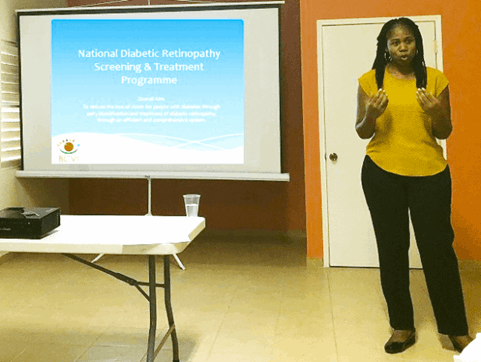
Leolyn Garcia teaching on the DR screening programme and BCVI services.
Leolyn Garcia, Programme Director at BCVI, outlined the referral mechanisms for patients requiring retinal screening and other BCVI services. She also discussed the barriers that patients face in accessing the programme.
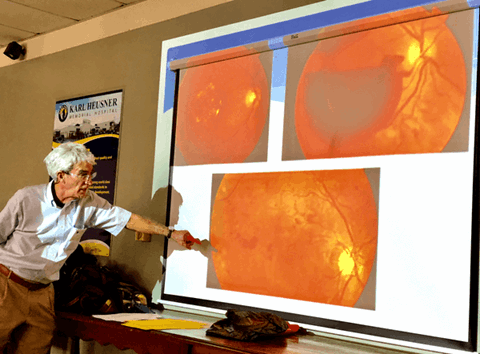
Baxter McLendon teaching on the clinical aspects of DR.
The clinical aspects of DR were outlined by Dr Baxter McLendon, visiting Ophthalmologist at BCVI. Dr McLendon explained the pathophysiology of DR to the primary care physicians and nurses, as well as the management and the procedures for retinal laser.
The sessions concluded with three key messages for the primary care staff:
- Retinal screening is essential to prevent blindness due to DR.
- Refer all PLWD for annual retinal screening at BCVI.
- Patients must be referred, even if they do not have any visual symptoms.
At the end of the training sessions it was noted that:
- The burden of DM and its complications in Belize are a public health concern.
- Strong support is needed from the MoH to prioritise prevention programmes for diabetes and DR, which are key to controlling the problem.
- There are various barriers in Belize that make it difficult for people to attend annual retinal screening. These include poor awareness of referral pathways by primary care staff and patients, lack of knowledge on diabetic eye disease from both patients and healthcare personnel, difficulties with access to clinic locations and limitations in the number of ophthalmologists and optometrists providing a service in the country.
- Scaling up the DR programme requires more regular educational sessions to inform physicians and nurses who diagnose and treat PLWD in primary care.
(L-R): Mark Mitchell (IT Manager / DR Programme Manager, BCVI), Phillip Castillo (Health Planner, MoH), Carla Ayres Musa (Executive Director, BCVI), Ellen Heinemann (Project Coordinator, LSHTM), Cova Bascaran (Technical Consultant, Caribbean DR Programme, LSHTM), Augustina Elijio (Chief Nursing Officer and Deputy Director of Health Services, MoH), Donovan Cacho (Health Planner / National Eye Care Coordinator, MoH).
3. Meeting with MoH
A debrief meeting was held at the end of the week at the MoH headquarters with the Chief Nursing Officer and Deputy Director of Health Services and a representative of the Policy Planning Unit to discuss the recent activities through the VISION 2020 LINKS programme and plans for sustainability of the DR screening and treatment programme.
As a result of this meeting, the MoH expressed enthusiasm to continue the work initiated by the VISION 2020 LINKS Programme, including technical support and collaboration in writing the Guidelines for Management of Diabetes in Primary Care as a key opportunity to include DR. This will be key to then establish official referral mechanisms for DR screening.
The importance of health promotion was highlighted, particularly from a bottom-up approach, as a way to empower PLWD to make the decision to attend an eye examination. Finally, plans were made to connect BCVI and the referral committee at the MoH to establish formal clinical pathways for DR screening.
Impact of capacity-building activities in Belize
Belize has now four internationally qualified screener / graders and an ophthalmologist capable of delivering quality laser treatment for DR. Through the Caribbean DR initiative, BCVI has been equipped with retinal cameras, OCT and laser.
In 2017 and 2018, the Belize National DR Screening and Treatment Programme has screened approximately 2300 PLWD across the country. Of these, 292 patients have received laser treatment for DR. Patients with other eye problems such as cataract, glaucoma and refractive errors have been identified through the programme and referred to BCVI clinics for treatment.
Looking to the future, the Belize National Programme will continue to work on integration into the primary health care system. Health promotion and formal referral pathways for PLWD to access retinal examination should be established. The MoH and BCVI should prioritise increasing human resources for eye care in the public health system, specifically the employment of a second ophthalmologist who can deliver DR treatment and other much-needed eye care services.
For more information on helping to build eye care services in Belize, either through the VISION 2020 LINKS Programme or via direct involvement as a volunteer with BCVI, please contact Marcia Zondervan.
References
1. The Queen Elizabeth Diamond Jubilee Trust
www.jubileetribute.org
2. Zondervan M, Bascaran C, Sandi C, et al. Diabetes and diabetic retinopathy: Changes in understanding of the disease over the last 25 years and how the UK is helping low-income countries tackle the challenges. Eye News 2018;25(1):22-8.
3. International Diabetes Federation
www.diabetesatlas.org
4. Williams P, Bailey M, Bascaran C, Zondervan M. Collaborating across the Caribbean to tackle diabetic retinopathy. Eye News 2018;24(4):26-31.
5. PopulationPyramid.net
www.populationpyramid.net/world/2017
6. Annual Report. Belize Council for the Visually Impaired 2017.
www.bcvi.org/annual-report-2017
7. Shillingford-Ricketts H, Bascaran C, Zondervan M. Sustainable prevention of blindness from diabetic retinopathy through prevention and control of diabetes mellitus – LINK partnership experience in Dominica. Eye News 2018;24(3):18-23.
8. DR-NET Laser Training Manual – available from VISION 2020 LINKS Programme on request.
9. Diabetes in Adults. NICE
https://www.nice.org.uk/guidance/qs6
(All links last accessed December 2018)

COMMENTS ARE WELCOME

